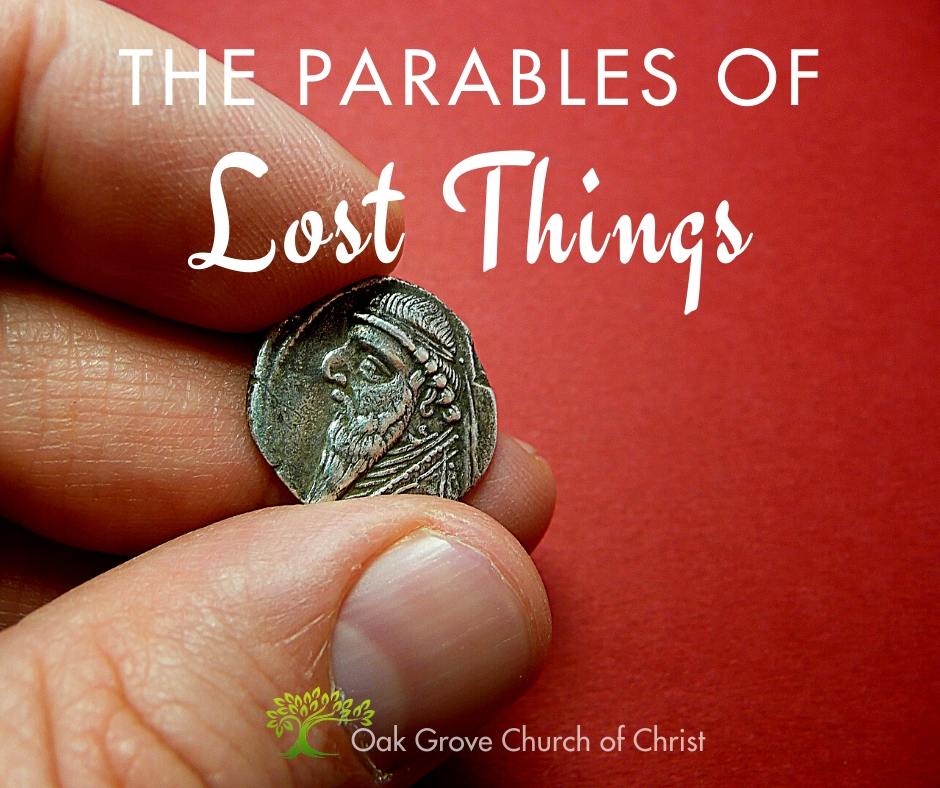The Pharisees were among the harshest critics of Jesus and His teachings. They leveled many criticisms against Him, chiefly because of His reception of the penitent publicans and sorrowful sinners.
“And the Pharisees and scribes murmured, saying, This man receiveth sinners, and eateth with them…” — Luke 15:2

The Three Parables of Lost Things
In response these hypocritical claims, Jesus tells three parables in Luke 15.
- The Parable of the Lost Sheep in Luke 15:3-7
- The Parable of the Lost Coin in Luke 15:8-10
- The Parable of the Lost Son in Luke 15:11-32
The similarities in these three parables are pointed and purposeful. In each of the parables the Shepherd, the woman, and the Father, respectively, lost something valuable to each of them.
• To the Shepherd, the lost sheep represented a loss of future income as well as the loss of time and effort previously spent on that particular animal.
• To the woman, the lost coin represented a loss of income and of future security. In a society where there was no social “security blanket” of protection, no welfare system and extraordinarily little margin between scratching out a living and the squalor of abject poverty.
• To the father the loss of a son represents, foremost, the loss of someone deeply loved and cherished, but also the loss of part of his legacy and his security in old age. To the Jews, a man’s wealth and worth were often counted in the number of sons which he had.
Finding the Lost Things
In each of these parables, the Shepherd , the woman, and the father, each put forth effort to recover what was lost.
The Shepherd left the ninety-nine sheep that were securely home in the place of safety and ventured into the wilderness. A wilderness is an untamed, desolate land where wild animals and possibly even bandits lurked. To leave a safe place to search the wilderness requires dedication and effort, as well as a willingness to risk one’s safety.
The woman put forth great effort in leaving no stone un-turned as she searched her house for the lost coin. The father, knowing that his son could not be forcibly brought home, showed his understanding that his son needed to come back of his own free will.
The father showed great love for the son in this. Like the modern proverb states,
“If you love someone, set them free. If they come back, they are yours; if they do not, they never were.” — Richard Back
The Father, in desiring his son’s genuine love, was willing to let him go, to risk the loss of that son forever, so that the son could find it in himself to reciprocate that genuine love. The point that the father saw the son returning, while he was yet afar off , indicates that the father was actively looking for that return.
The fact that he was watching for his son on the day that he returned also indicates that this was a habitual watching for that return. The father shows that he has not given up on his son’s return. We also see the father’s love and concern for the son because, when he saw him a great way’s off, he ran to him instead of waiting for his son.
Rejoicing for Finding the Lost Things
In each of these parables, we see great rejoicing when that which was lost was found!
At the end so each of the first two parables, Jesus stated, “Joy shall be in heaven over one sinner that repenteth…” and “there is joy in the presence of the angels of God over one sinner that repenteth…”
In the lost son parable, we also see great amount of rejoicing where, the father expressed this great sentiment, “It was meet that we should make merry, and be glad: for this thy brother was dead, and is alive again; and was lost , and is found.”
The Meaning of the Parables of Lost Things
There is, however, one notable difference in the tone of these three parables of lost things. We noted the great rejoicing in heaven, in the presence of the angels, and with the father in the three parables, respectively. Nevertheless, in the parable of the lost son, we see one individual who, rather than rejoicing at the return of the lost brother, resented him for having left and the father for rejoicing at his return.
The Shepherd, the woman, and the father each represent our heavenly father in these parables.
The things lost represent the publicans and the sinners. Heaven and its angels represent God and all of those who are truly spiritual and are faithful children of God. The resentful older brother is representative of the Pharisees.
Christ, the great Shepherd, came to seek and to save that which was lost, Luke 19:10. Christ, the Great Physician, came to heal sinners of the disease of sin, Luke 5:31-32. Christ, as our elder brother, Romans 8:17, came to reconcile lost man back to His Heavenly Father, Ephesians 2:16.
The faithful child of God should greatly rejoice when a lost soul is returned to the fold.
The Pharisees, on the other hand, were guilty of the same sin as the elder brother. The sin of the Pharisees was not a sin against morality, as was the case with the Publicans and sinners, but it was a sin of the heart. They prided themselves on their faithfulness and thought the Messiah would have given them a proverbial pat on the back.
But instead, Jesus rebuked them for their adherence to tradition over God’s commandments and their unforgiving attitude. Because of their self-righteousness, Romans 10:1-3, they failed to recognize their own reality of being lost just like the older brother failed to realize that he too was lost, although He had not wasted his substance in riotous living.
When we have the attitude of the elder brother, we cannot be pleasing to the father. We must have a forgiving mindset and an attitude of humility. Otherwise, we too will be guilty of the Pharisees’ sin.
— By Jack W. McNiel



